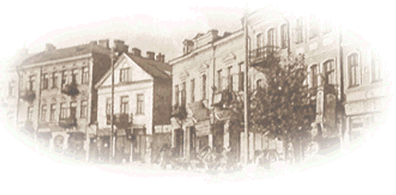
Tomasz Wisniewski's book Review in the "New York Times"
CORRESPONDENT'S REPORT / By JANE PERLEZ
Bialystok Guide Recalls a Center of Polish Jewry
WARSAW -- Increasingly, American Jews are traveling to Poland to
unearth family histories or to revisit a past that is painfully known. These are often moving and solemn trips taken for emotional and personal reasons. Now a carefully researched guidebook has come along that concentrates on Jewish history, people and places in eastern Poland and its main border city,
Bialystok.
Called "Jewish Bialystok and Surroundings in Eastern Poland," the guide is written by Tomasz Wisniewski, a 40-year-old journalist who was jailed by the Communists during martial law in the 1980's for his dissident activities. Mr. Wisniewski, who is not Jewish, spent his time in prison researching the region's Jewish heritage and learning basic Hebrew.
In contemporary Poland, Bialystok has turned itself from a drab Communist outpost into a bustling market town where traders from the former Soviet Union hawk their goods and then move west. Before World War II, Bialystok's population was more than 60 percent Jewish, giving it the highest concentration of Jews of any city in the world, Mr. Wisniewski writes.
Historians have estimated that 200,000 Jews from the Bialystok region
were murdered, with about 60,000 of them taken from the ghetto in the city. Today, only about half a dozen Jews live in the city, which was largely rebuilt after heavy destruction in the war.
To get a sense of what Jewish Bialystok was like, Mr. Wisniewski has
myriad suggestions. Here are just a few places to visit:
The Jewish Cemetery on Wschodnia Street, the largest Jewish burial
site in northern Poland. The Germans removed many of the burial stones, but about 7,000 remain in the 30-acre site. Of interest to New Yorkers is a 1922 memorial to Rabbi Chaim Herc Halpern, who was chief rabbi in
Bialystok for more than 50 years. The memorial was a gift of Bialystok
Jews living in New York. To the right of the Halpern memorial is a black marble pillar commemorating the victims of the Jewish pogrom in 1906.
The Synagogue at Branickiego Street, destroyed during World War II,
was partly rebuilt for use as a movie house and then a sports hall. At the back of the building, some characteristic Jewish architectural details were included, like high half-rounded windows and a small apse. A plaque
describing the synagogue's history was added in 1992.
The Hebrew Gymnasium at 79 Sienkiewicza Street, now a hospital, was
the leading Jewish school in Bialystok and one of the finest academies in pre-World War II Poland. Graduates, among them former Israeli Prime Minister Yitzhak Shamir, celebrated the 70th anniversary of the school in 1990 at a reunion in Haifa, Israel. In Tykocin, about 20 miles west of Bialystok, stands the Great Synagogue, built in 1642 and considered one of the best-preserved sites of Orthodox Poland. The synagogue, a fortified square structure with a high mansard roof, was heavily damaged by the Nazis but was rebuilt after the war and is a museum. Services are held at the
request of visitors.
Mr. Wisniewski says that small evocative details can allow visitors to
reach back to the past. He mentions the stamp of the Sholem Aleichem Jewish Library found on an old book in an antiquarian book store or the empty space a mezuzah once occupied, or a detail from a Star of David on a wall. His book includes period photographs that help recreate the lost
landscape of Jewish life. Bialystok is about three hours by car from Warsaw, but it can also be reached by train or bus.
Mr. Wisniewski also points out that halfway between Warsaw and
Bialystok, visitors can stop at Treblinka, the death camp where the Nazis killed more than 800,000 Jews. The site has been transformed into a field of symbolic tombstones, each one representing a town whose Jewish residents were killed in the camp.
The foreword to the guide is by the food critic Mimi Sheraton, whose
forebears came from other parts of Poland, but who became enchanted with the town when she traveled there to try bialys on their home ground for a book she is writing. Her researcher was Tomasz Wisniewski.
"Jewish Bialystok and Surroundings in Eastern Poland" can be ordered
through the Ipswich Press, Post Office Box 291, Ipswich, Mass. 01938. It costs $12.95; add $2.95 postage for the first copy, 50 cents for each additional one. It is also available from www.amazon.com.
For more information about Mr. Wisniewski's genealogical service or
his research on synagogues in eastern Poland, see the Web site www.gold-cousins.org.
Order
Jewish Bialystok And Surroundings in Eastern Poland Today!
More about Tomasz Wisniewski in Polish
| Dialogue | ||